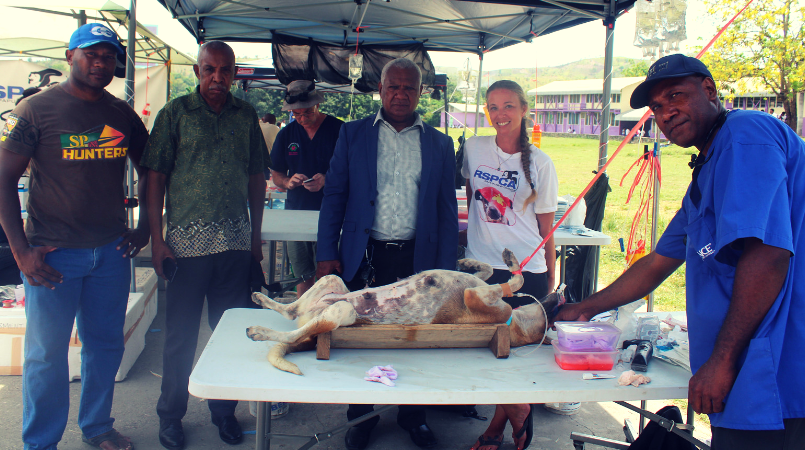
The National Capital District Commission (NCDC), in partnership with the Royal Society for Prevention of Cruelty Against Animals (RSPCA), has begun an outreach dog registration and desexing program in the city.
This aims at controlling the increasing dog population.
The exercise is in response to the city’s uncontrolled dog population brought about by stray dogs and the undue care and attention of owners.
“We have a situation in the city where dogs are freely roaming the city without any care and attention,” says City Manager, Bernard Kipit.
“This exercise in consultation with RSPCA is to bring the situation to a manageable level to better control the relevant concerns of health and other social issues,” he said.
Kipit emphasised that owning a dog as a domestic pet is a choice for individuals that comes with responsibilities of caring for it. NCDC cannot stop this choice but can only monitor the situation.
The City Manager appealed to the city residents: “If you want to keep your dogs then you must first register them and keep their numbers down to no more than two.”
NCDC in close consultation with RSPCA embarked on this initiative to exert control on the situation with dogs in the city as well to show its care for the welfare of dogs and the responsibilities involved.
“The NCDC and RSPCA are building a very good relationship and this seems to be the first time for the RSPCA to come out to the community and have a set up like this. I believe there will also be other set ups in other areas and I am really excited and I really want to encourage everybody to be part of this partnership,” Kipit said.
The outreach program is currently underway at the Tokarara Secondary School field this week and involves registration of dogs at a minimum fee of K10 and the option of desexing the dog.
According to information provided by RSPCA, desexing is a surgical procedure performed by qualified veterinarians that stops the animals from reproducing.
It is described as an effective and permanent way to prevent unwanted pregnancies in dogs and to prevent unwanted and homeless animals.
Dr Jessica Hoopes, Practice Manager of RSPCA, said preliminary findings by RSPCA on dogs in the city revealed that there were more dogs on the streets than the number of dogs owned by people.
“Owners disown their dogs and remove them when they become sick. This was how dogs end up as strays,” Dr Hoopes added.
She was thankful for the support of NCDC with the program while confirming that the situation on dogs in the city has reached concern levels and requires the attention of NCDC and all parties concerned, including the public.
“We are coming out to the communities to make them aware of the situation and the relevant actions we are taking to address the situation,” Dr Hoopes said.
The response was slow when the program started this week but as the week went on, the numbers picked up with about twenty five dogs a day. The team will be at the Tokarara Secondary School premises to the end of the week.
This is the second outreach program the team is undertaking. The first engagement was on Fisherman Island last week and further programs will be assessed and finalised for implementation in the New Year.
“The aim is to make the people aware of the situation on dogs and to make them aware of what they need to know about owning a dog in a city,” Dr Hoopes added.
The RSPCA team involved in the operation involves 40 volunteers of qualified veterinarians from the United States, Australia and the Philippines and the able support of local volunteers.
(RSPCA Operations Manager, Johnny Kasom, NCDC Chief Health Surveyor Isowa More, City Manager Bernard Kipit, Dr Jessica Hoopes, Practice Manager of RSPCA with a local veterinarian at Tokarara)
